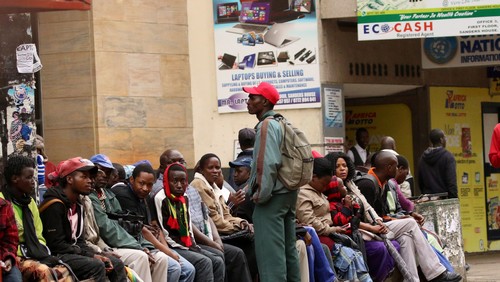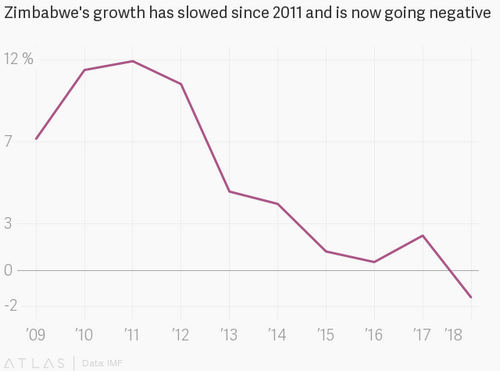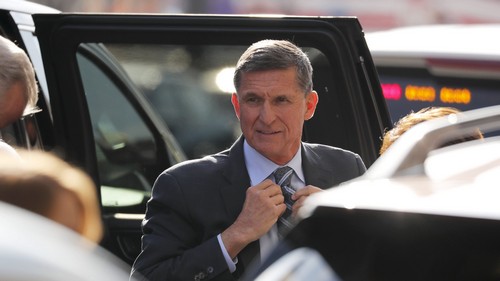The political dust surrounding Robert Mugabe’s exit as leader of Zimbabwe last week may be settling but, arguably, an even bigger task awaits the country’s new president, Emmerson Mnangagwa: how to save the economy.
The challenge the new president faces is fixing the struggling economy even as calls grow louder for the abandonment of the flawed Zimbabwean bond notes and quickly restore faith with international investors. It’s a bit like changing a car’s wheels even as it hurtles towards a brick wall.
Mugabe presided over the transition from regional powerhouse into the economic ruin that Zimbabwe has become. The last decade, in particular, has been dominated by cash liquidity problems, dollar shortages, crumbling rail and road infrastructure and crippled utility service supplies. These challenges and the worsening employment prospects had driven many Zimbabweans out of the country to seek greener pastures elsewhere. Foreign exchange shortages have meant Zimbabwean companies are unable to pay for key imports such as raw materials while the state frequently failed to pay for electricity and medicinal imports.
“Now with a new Zimbabwe on the horizon, businesses of all kinds stand a fighting chance to get back on their feet and begin to develop”, Charles Laurie, the head of country risk at Verisk Maplecroft said.

Harare, Zimbabwe
“This will be a long and expensive process, but political leaders will have domestic support and international goodwill.” President Mnangagwa said on Friday that there will be no going back on land reform, but noted former white commercial farmers will be compensated. He also welcomed international investors for partnerships. The new Zimbabwe leader will have to be realistic and prioritize tackling the economy head on, say Zimbabweans, who are hopeful to see the economy flourishing once again.
“We are still unable to get money from the banks and people still don’t have jobs, said Bright Jesinawo, who runs a mobile money agency business in Harare. “The new president has to sober up and change things from the way Mugabe was handling it.Mugabe was only concerned about himself and consolidating his power but we hope this will change.”
There have been calls for Zimbabwe to revert back to the US dollar and abandon the bond notes or adopt the South African rand in the interim but this will depend on the new president’s priorities which are yet to be fully revealed as he is expected to announce a new cabinet this week.
A top adviser of Mnangagwa, Larry Mavima, believes that Zimbabwe requires its own currency but highlights that this will only happen once there is confidence in the economy. Zimbabwe’s budget deficit for this year is expected to bloat to $1.2 billion, up from about $400 million last year.
The shortage of foreign exchange and fears of a repeat of Zimbabwe’s 2008 hyperinflation crisis has led to some Zimbabweans turning to bitcoin as a storage of value. But the demand versus supply has been such that on the Golix exchange in Harare, the value of bitcoin in Zimbabwe has soared past the global norms. It has hit as high as $16,500 while globally the most recent record is nearing $10,000.

The African Development Bank says Zimbabwe’s GDP growth is projected to increase by 1.3% in 2017 spurred “mainly by agriculture in view of favorable rains, tourism, manufacturing, construction and financial” sectors. The government says the economy will grow by around 3% although inflation has been creeping up after rising to 2.24% in October from 0.78% in September.
But for any turnaround to come, Zimbabweans have to ready up for belt tightening. Mnangagwa is expected to heed “advice from the IMF to trim the country’s civil service and to cut state spending”, said economist Moses Moyo.
“This will be a long and expensive process, but political leaders will have the winds behind them in the form of domestic support and international goodwill”, said Verisk Maplecroft’s Laurie.
The big companies with operations in Zimbabwe such as Impala Platinum, Sibanye Gold and Econet Wireless say they are sticking with their investments in the country. Impala Platinum runs the country’s biggest mine, Zimplats and jointly owns the Mimosa mine together with Sibanye. Econet Wireless, the biggest telco in the country, said it was committed to success in the country as reports showed Monday that it was planning a listing in London next year.
The Zimbabwe Stock Exchange is expected to self-correct after a bull-run as investors ditched monetary and other risky assets such as real estate, with IH Securities analysts anticipating strong trade and value in blue chip counters such as Old Mutual Zimbabwe, brewer Delta Corporation and Econet.
With Mugabe gone, and the sun rising on a new era for the country, focus for the country will likely shift from politics towards the economy.


